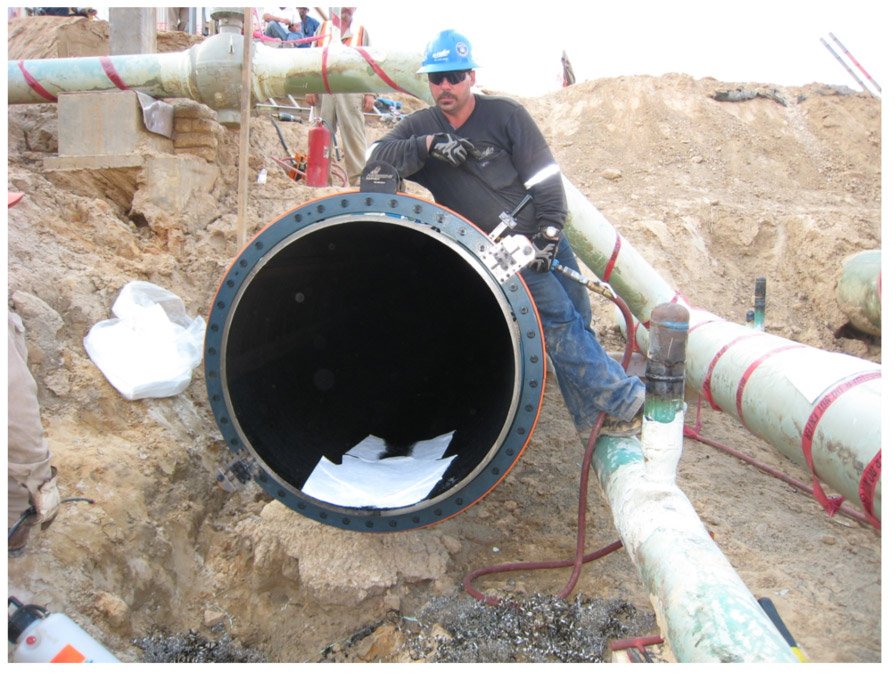
Line Isolation & Inline Weld Testing
Schedule & Asset Friendly Solutions
Traditional isolation procedures for weld testing demand lengthy schedules and unmitigated risks. Numerous blind flanges, skillets, and air movers are required in order to clear the asset of harmful vapors, where even with the use of air movers controlling vapor gases are unpredictable. These risks coupled with project constraints make traditional isolation and weld testing procedures outdated.
Understanding that facility work areas demand schedule and asset friendly solutions, isolation and inline weld testing tools empower fast response, minimize multiple contractors onsite, and deliver proven and safe pipe cavity operations.
Our Services
Vapor Barrier and Hot Work Isolation
Localized ID Weld Seam Pressure Test
Inline Isolation Tool
Inline isolation tools advance safe construction tasks related to welder safety, pressure testing, and weld seam integrity testing. Through the use of patented mechanical functionality, isolation and inline weld testing technology monitors seal integrity and safely vents vapor gases away from the immediate hot work zone. By mechanically performing a double block and bleed upstream of the planned hot work area, a set of compression bolts seal the tool and the internal diameter of the pipe asset. Water and other mediums are then inserted into the annulus of the tool and pressurized to ensure an adequate seal on the desired cavity area. In the duration, pressure is monitored to ensure seal integrity. Once confirmed, vapors are allowed to exit the isolation and inline weld testing tool prior to initiating hot work. This procedure is replicated for weld test integrity, eliminating the need for performing a pressure test on the entire asset.
Services
Vapor Barrier and Hot Work Isolation
Localized ID Weld Seam Pressure Test
1/2” - 42” Sizes Available
Available for multiple pipe schedules
Applications
Process Piping Modifications
Flowline Modifications
Pipeline Repairs
Riser Repairs
Industries We Serve
Refineries
Food
Pharmaceutical
Tire Plants
Petrochemical Plants
Chemical Plants
LNG
Fertilizer
Renewable Energy
Alternative Energy
Advantages of Using BlueFin
Safely monitor and vent vapors away
Monitor seal integrity throughout the hot work process
Eliminate the need for multiple blind flanges
Commonly used in tandem with cold cutting
Inline Isolation Tool
Vapors Released Downwind of Hot Work
The traditional way of isolating a flowline, is to install numerous blind and skillet flanges, as well as utilizing air movers, to clear the flowline of harmful vapors. When utilizing air movers, you aren’t always able to control where the vapors go once released to the atmosphere. Wind direction plays a major part in this process.
Enter the inline isolation tool. A LO/TO, as well as double block and bleed are established. The tool is placed into the flowline, upstream of where the hot work is to be performed.
Product Description
A set of seals are energized by compression bolts, or hydraulically actuated, which forms an impermeable seal between the tool and the ID of the flowline. Water, or other medium, is then inserted into the annulus of the tool, and pressurized to ensure an adequate seal.
The pressure is then monitored via a gauge to ensure continued integrity of the seal. The vapors are then allowed to pass through the isolation tool via a hose, and released to the atmosphere downwind from the hot work. This allows you to have complete control of where the vapors are released.
This same tool can be moved forward, once the hot work has been completed. The welded seam is positioned between the seals on the tool. The seals are energized, test medium is pressured up in the annulus, and pressure is monitored testing the integrity of the weld seam. This is typically achieved via a certified gauge.
Applications
Flowlines
Pipelines
Consult Our Specialist
Related Resources








